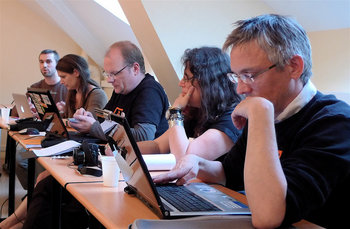
Natural Language vs Formal Language
Formal languages such as languages of logic, mathematics or programming typically have well defined syntax and semantics. As such, data expressed in a formal language is reasonably unambiguous.Attempts are made to define formal rules of grammar for natural languages. However, languages change quickly and have many styles based on context such as differences between formal writing and informal speech. As such, a natural language can't be accurately reflected with a well-formed set of syntax and semantics. Natural languages are filled with nuances, double meanings and ambiguous statements that require context and experience with a language to understand.| Natural Language vs Formal Language | ||
Natural Language | Formal Language | |
Definition | A language that evolved amongst people. | A language invented to serve a purpose with well defined syntax and semantics. |





























